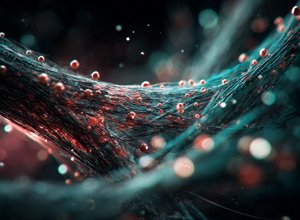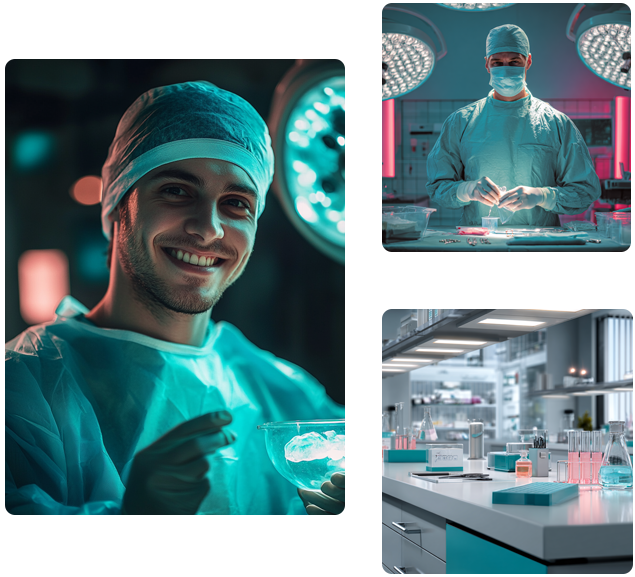(Coming Soon)
Allograft Tissue Products
launching in Canada soon
High-quality donor bone grafts with superior processing
Our team has decades of global experience in processing allograft tissues for surgical use. Allografts are donated human tissues (such as bone, cartilage, skin, etc.) that can be transplanted to replace or repair a patient’s damaged tissues. They are indispensable in modern surgery, with over 500,000 bone grafting procedures in the North America each year. We are leveraging our 20+ years of expertise to bring a full line of AlloWide Allograft products to the Canadian market in the near future—to be produced under stringent quality systems, following planned certification and regulatory approvals.
Our Allograft Product Range
-
Orthopedic Bone Grafts:
-
Cortical bone segments, cancellous chips, and bone powders for fractures, joint fusions, and bone void filling. Grafts will be offered in various shapes and sizes (e.g., femoral strips, spinal wedges).
-
Spinal Allografts:
-
Structural bone grafts (e.g., interbody spacers) and demineralized bone matrix (DBM) for spinal fusion procedures.
-
Dental and Craniofacial Allografts:
-
Bone granules, blocks, and plug grafts for oral surgeries such as socket preservation, sinus lifts, and jaw reconstructions.
-
Soft Tissue & Other (future pipeline):
-
Plans include tendon/ligament grafts, skin substitutes, and cartilage grafts for joint repair — all under future development and pending appropriate certifications.




Uncompromising Quality & Safety
We are designing our Canadian allograft facility and product pipeline to align with the highest safety and quality benchmarks, including:
-
Rigorous Donor Screening:
-
Planned protocols will include full donor screening, social/medical history, and advanced lab testing (e.g., viral panels: HIV, Hepatitis B/C, HTLV, WNV; bacterial cultures).
-
State-of-the-Art Processing:
-
Processing will be performed in cleanroom environments (Class 100–10,000), incorporating techniques such as decellularization and tissue-specific sterilization.
-
Quality Assurance:
-
We aim to operate under a certified quality management system (ISO 13485 and ISO 9001) and conform to other relevant standards (e.g., ISO 14644, 11737, 10993).
-
Sterility and Preservation:
-
Preservation methods to include deep-freezing, lyophilization (freeze-drying), or cryopreservation—depending on graft type—with packaging to support hospital handling.
-
Regulatory Compliance:
-
All products will be submitted for licensing under Health Canada’s human cell/tissue regulations, with parallel alignment to FDA and AATB standards for future global distribution.
Why Choose Allografts?
-
Proven Clinical Principles:
-
Allogeneic (donor) bone grafts have a long track record of success in helping patients heal. Compared to autografts (using the patient’s own bone), allografts avoid an extra surgery to harvest tissue, thus reducing pain, infection risk, and anesthesia time for the patient. Patients treated with allografts often experience faster overall recovery and fewer complications related to the graft site, since no second surgical wound is created.
-
Accessibility & Convenience:
-
We plan to offer off-the-shelf availability in customizable formats and dimensions—particularly helpful in trauma, oncology, or extensive surgeries.
-
Cost-Effective Care:
-
Studies have indicated that using donated allograft tissue can be more cost-effective than autologous grafting. When you factor in operating time and recovery, an allograft transplant can cost roughly 25% of an autograft procedure on average. By using allografts, hospitals save resources and patients avoid the additional pain and expense of a second surgery.
-
Excellent Biocompatibility:
-
Human allograft bone integrates well with the body. It provides a natural scaffold for new bone to grow, often resulting in better bone formation and fusion than synthetic alternatives or animal-derived grafts. Allografts preserve the biomechanical properties of real bone, which means they can restore structural integrity while being gradually remodeled by the body. Patients also benefit from lower rejection rates since the graft is decellularized and matched to human biology.
-
Preservation of Anatomy:
-
Using allograft bone allows surgeons to fix problems without sacrificing the patient’s own bone stock. This preserves the patient’s anatomy and avoids weakening other parts of the skeleton. It also leaves the patient with “bone in bank” – their own bone tissue remains intact for potential future needs. Surgeons appreciate having allograft options to address complex issues while maintaining the patient’s natural structures.
-
Surgeon Confidence:
-
Surgeons can count on our future products to be sterile, safe, and consistent—built on our international track record of biologics excellence.


Coming Soon
AlloWide’s allograft products are in development and expected to launch soon. We are in the process of establishing a Canadian tissue processing facility that will utilize our international know-how right here at home. By producing locally, we will strengthen Canada’s biomedical sector, ensure a reliable supply of grafts, and create high-value jobs in regenerative medicine. Our timeline includes completing final validations and obtaining necessary health authority approvals. We anticipate offering initial products for orthopedics and dentistry by next year, with expansion into other graft types thereafter.
For surgeons, hospitals, and distributors interested in our allograft catalog, stay tuned!
we will provide updates on availability, and our team is happy to discuss your specific needs and how AlloWide allografts can benefit your practice. Your patients deserve the best, and we are committed to delivering just that with our future product line.
